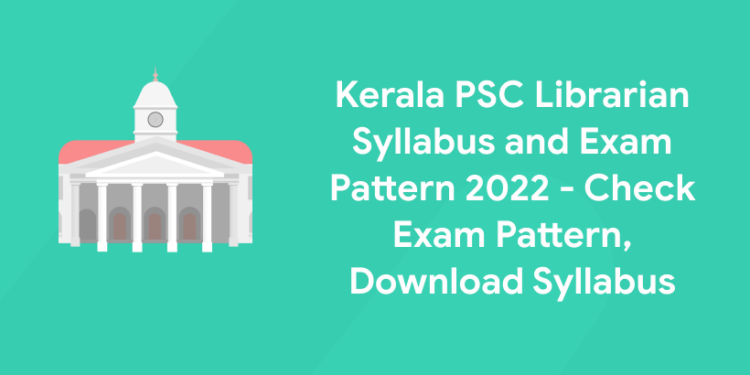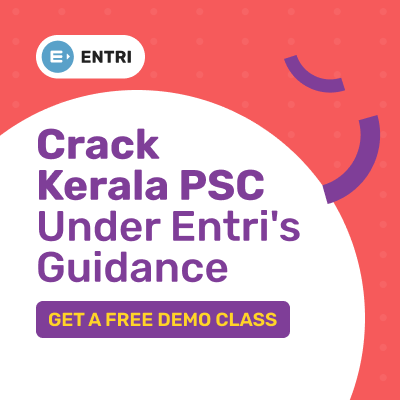Table of Contents
Kerala PSC Librarian Syllabus 2022 & Exam Pattern PDF Download: Candidates can look at this page to get more about the Kerala PSC Librarian Syllabus 2022. All candidates looking online can find correct information on the Kerala PSC Syllabus 2022 on this page. We have gathered the data from the official website and provided it here for the candidates in order to make it simple for such hopefuls. The Kerala PSC Librarian Syllabus 2022 can also be downloaded directly by candidates by clicking on the provided link.
The exam carries a 100-point maximum score. The exam lasts one hour and thirty minutes and only asks about educational qualifications. There will be multiple-choice, objective-type questions. For a more thorough explanation of the format of this exam, refer to the section exam pattern.
Kerala PSC Librarian 2022 – Overview
| Particulars | Details |
| Name of the Organization | Kerala Public Service Commission (KPSC) |
| Post Name | Librarian |
| Name of Department | Kerala Administrative Tribunal |
| Category | Syllabus |
| Method of Appointment | Direct Recruitment |
| Age limit | 18-36 Years |
| Official Website | keralapsc.gov.in |
Kerala PSC Librarian 2022 – Exam Pattern
1: Which Year First Assembly Election was held in Kerala?
Here, we’ve provided comprehensive information on the Kerala PSC Exam Pattern 2022 in order to assist all applicants who have submitted applications for the position of librarian in the exam 2022. Both the Kerala PSC Librarian Syllabus and the Kerala PSC Librarian Exam Pattern 2022 are available for download by candidates. This would be very beneficial for all applicants to learn everything there is to know about the subjects, which will be helpful when preparing to get better grades. Getting a high score will aid applicants in being chosen for the position of librarian. Check the table below for information on the names of the subjects, the total number of questions on the papers, the time allotted, and the overall score.
- The maximum marks are 100.
- The time allotted is 1 hour and 30 minutes.
- The medium of the question paper is in English.
- The mode of the exam is OMR (Multiple Choice Questions).
| Topics | Number of Marks | Time Duration |
| Foundations of Library and Information Science | 10 Marks | 1 Hour 30 Minutes |
| Knowledge Organization: Library Classification | 10 Marks | |
| Information and Communication | 10 Marks | |
| Information Sources | 10 Marks | |
| Information Products and Services | 10 Marks | |
| Library and Information Center Management | 10 Marks | |
| Cataloguing and Metadata | 10 Marks | |
| Intellectual Property Rights | 10 Marks | |
| Information Technology Applications in LIS | 10 Marks | |
| Total Marks | 100 Marks |
Attempt free mock test to ace your Kerala PSC 2022 preparation
Kerala PSC Librarian 2022 – Syllabus
Download the Kerala PSC Librarian Grade 4 Syllabus 2022 from this section of this page. This Kerala PSC Syllabus 2022 plays a prominent role for all the candidates preparing for the exam. Take a look at the Kerala PSC Librarian Syllabus 2022 which has been given for the sake of the applicants so, take a look at the below-listed topics and collect the required data
Module 1 Foundations of Library and Information Science
- Social and historical foundations of the library; Different types of libraries: their distinguishing features and functions; Role of the library in formal and informal education.
- The changing concept of librarianship.
- Five Laws of Library Science; Implications of the five laws in library and information activities.
- Development libraries with special reference to India; Library movement of Kerala. Resource sharing and Library Networking.
- Library legislation: need and essential features’ Library legislation in India, Kerala Public Libraries Act; Press and Registration Act and Delivery of Books (Public Libraries) Act.
- Professional associations and their role: ILA, IASLIC, IATLIS, CILIP, SLA, ALA, ASLIB.Promoters of LIS: UNESCO, FID, IFLA, UGC.
Module 2 Knowledge of Organization: Library Classification Theory
- Structure and attributes, modes of formation of subjects.
- Library classification and its functions. Enumerative and faceted schemes Mapping of the Universe of subjects in the major schemes of Library Classification (DDC, UDC, CC, and LC).
- Normative Principles for Idea Plane and Verbal Plane; Principles for Helpful Sequence Facet Analysis as used in the CC; Principles for Facet Sequence; Postulational procedure; Devices to form and sharpen isolate numbers.
- Notation system and its functions; Qualities of a good notation system – Hospitality and Mnemonics; Zone analysis.
Module 3 Information and Communication
- Information: Characteristics, nature, value, and uses; Conceptual difference between data, information, and knowledge.
- Communication: Channels – formal and informal; models; barriers, Trends in scientific communication.
- Information industry: generators, providers, and intermediaries; Information audit.
- Information management; Knowledge management.
Crack competition and ace exams !!
Module 4 Information Sources
- Evolution of physical media; Classification of information sources – Print and nonprint; Documentary and Non-Documentary; Primary, Secondary and Tertiary Sources of Information – their categories and characteristics.
- Evaluation Criteria; Detailed Study of dictionaries, encyclopedias, yearbooks, directories, biographical sources, geographical sources, statistical sources, sources of current information.
- Databases, Portals, Subject Gateways; Open Access Resources.
- Search Engines, Search Techniques.
Module 5 Information Products and Services
- Categories of information users; Information needs, definition; Types and models; Information seeking behavior.
- User studies, methods, technique, and evaluation.
- Concept, definition and trends, virtual reference service, examples of Electronic reference service; Reference Interview, and search techniques.
- Information services, concept, definition need,s and trends Alerting services – CAS, SDI, technique, evaluation Bibliographic, Referral, Document Delivery, Referral centers.
- Abstracting and Indexing services; Document Delivery Services.
- Translation, Reprography.
- Study of national, International Systems and Services, NISCAIR, DESIDOC, NASSDOC, SENDOC, UNISIST, AGRIS, MEDLARS, OCLC.
Prepare For Kerala PSC Exam – Download Entri App.
Module 6 Library and Information Center Management
- Different sections of library and information centers and their functions.
- Collection development: Acquisition procedures: selection, ordering, accessioning, and stock editing.
- Technical processing: Classification, Cataloguing, and physical processing.
- Maintenance of documents: work with new, returned, damaged, and lost documents. Stock verification, binding, care, preservation, and restoration of print and electronic documents.
- Circulation control: Charging systems, interlibrary lending.
- Serials control: Selection, ordering, receipt, and display.
- Special collections.
- Sources of Finance; Library Budget, Budgeting, and Accounting.
- Building: Layout and space estimation; Furniture and equipment.
- Library rules; Staff Manual; Library Statistics.
- Types of Report: Annual report, Progress / Review reports.
Module 7 Cataloguing and Metadata
- Bibliographic record and its structure and functions; Different kinds of bibliographic files; The library catalog and its functions; Classified and Dictionary Catalogues; OPACs.
- Principles of Description; Standards for Description: ISBDs, AACR-2, RDA.
- Bibliographic Record Formats – ISO 2709 and the MARC family of Formats, MARC XML.
- Problems in subject search and retrieval; vocabulary control; Thesauri.
- The general theory of subject indexing languages (SIL) of G. Bhattacharyya; Indexing Systems – Lists of Subject Headings, Chain Indexing.
Module 8 Intellectual Property Rights
- Berne Convention; Universal Copyright Convention; Stockholm Conference; Paris Conference; WIPO Copyright treaty; GATT; TRIPS.
- Copyright law of India and its amendments.
- Patent law of India and amendments
- Protection of web-based content; Copyright and libraries; Copy left movement; Creative Commons; Plagiarism.
Module 9 Information Technology Applications in LIS
- Planning and implementation; Automation of in-house operations – file requirements for Acquisition, Cataloguing, Circulation control, Serials Control, OPAC.
- Library Automation packages: KOHA, E-Granthalaya.
- Web 2.0 tools and services; Internet security.
Module 10 Digital Libraries
- Concept and definition; Historical Development of Digital Libraries.
- Open-source software; DSpace.
Kerala PSC Librarian 2022 – Syllabus PDF
The link provided below will allow you to obtain the Kerala PSC Librarian Syllabus 2022. The Kerala PSC Librarian Syllabus 2022 is available here. Candidates will be more prepared and able to plan their time according to the exam’s structure after doing this.
Click Here To Download Kerala PSC Librarian Syllabus 2022
Entri offers you best wishes as you get ready for your exams. Utilize the Entri App to make your exam preparations considerably more planned and productive. You will be able to better understand topics, identify the types of questions that are frequently asked, and increase your level of confidence with the assistance of knowledgeable mentors and the hundreds of practice exams on numerous subjects. We hope your future initiatives are successful.













